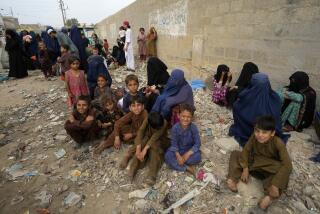70 Nations Act to Stem Flow of ‘Boat People’ : U.N. Plan Calls for Screening of Vietnamese, Laotian Refugees Before Asylum Is Granted
- Share via
GENEVA — For the first time since the end of the Vietnam War, Vietnamese and Laotian refugees will be subjected to a mandatory screening procedure to determine whether they are eligible for asylum in other countries, according to a plan adopted Wednesday by a U.N.-sponsored conference on Indochinese refugees.
Under pressure from the United States, delegates from 70 countries to the International Conference on Indochinese Refugees stopped short of specifically endorsing forced repatriation of “economic refugees”--those determined in the screening process to have fled Vietnam for economic and not political reasons.
However, the conference clearly signaled an end to an era of unquestioned asylum for Indochinese “boat people,” more than 1 million of whom have fled their country since the Vietnam War ended in 1975. About 850,000 Indochinese refugees have resettled in the United States alone, approximately 600,000 to 700,000 of them Vietnamese.
“Asylum-seekers can no longer assume that they would be automatically regarded as refugees and therefore entitled to automatic resettlement,” conference President Abu Hassan, foreign minister of Malaysia, said in his concluding remarks. “They must understand--indeed they must be made to understand--that within the framework of the comprehensive plan of action, they will be subjected to status-determination procedure”--screening.
The plan adopted by a consensus of the delegates establishes several voluntary programs aimed at stemming the increasing flood of refugees from Vietnam, including counseling and economic assistance. It also calls for an expansion of an existing departure program inside Vietnam to a level of 6,000 per month, most of whom would be resettled in the United States.
So far, however, voluntary repatriation schemes have failed to staunch the flow of so-called clandestine refugees who have fled Vietnam in small boats, braving open seas, pirates and gunships of hostile neighboring countries.
Hong Kong Experience
“Voluntary repatriation is no answer,” said British Foreign Secretary Geoffrey Howe, who pointed to the experience in the British-administered colony of Hong Kong, which one year ago began a rigorous screening process and voluntary repatriation program for its more than 40,000 refugees.
“Of Hong Kong’s boat people population of well over 40,000, fewer than 150 have so far returned voluntarily,” Howe said.
The U.N. refugee commissioner estimates that there are more than 90,000 boat people now in camps awaiting screening--32,800 of whom arrived in the first five months of this year.
A conference proposal that was greeted with slightly more optimism was for a regional holding center in one of the coastal states near Vietnam, to hold refugees who have been “screened out” before they can be returned, voluntarily or not, to Vietnam.
A representative of the Philippines offered that his country would provide a site for such a holding center, although not specifically for the unwanted, “screened-out” category of refugees.
The voluntary/mandatory repatriation question is complicated by Vietnam’s adamant refusal to accept any of its citizens who do not wish to return.
“We are not the ones who caused these refugees,” Vietnamese Foreign Minister Nguyen Co Thach said in a press conference after the meeting. “If you want to find the people who caused this problem, do not look at the people who fought the war against the United States.”
Asked why his government has not attempted to stop the flow of refugees, Thach responded: “In your countries you cannot even stop drug traffic. Drugs don’t have legs. People do.”
Although it was clearly the unstated theme of the conference, delegates carefully avoided using terms such as “deportation,” which would put them in the position of turning back the refugees, including many recent emigrants from northern Vietnam.
Instead, they talked of “genuine” refugees, meaning political refugees, most of whom worked with the American forces during the war, and used other euphemisms such as “clandestine refugees” to describe a policy clearly aimed at closing the door on any new outpouring of refugees.
“If, after the passage of a reasonable time,” the report adopted by the United States and other countries stated vaguely, “it becomes clear that voluntary repatriation is not making sufficient progress toward desired objectives, alternatives recognized as being acceptable under international practices would be examined.”
More to Read
Sign up for Essential California
The most important California stories and recommendations in your inbox every morning.
You may occasionally receive promotional content from the Los Angeles Times.












